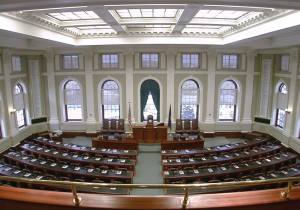 AUGUSTA, Maine — A senator in Maine has introduced a religious freedom bill that seeks to protect the people from unlawful government actions.
AUGUSTA, Maine — A senator in Maine has introduced a religious freedom bill that seeks to protect the people from unlawful government actions.
Senator David Burns (R-Whiting) unveiled the legislation, LD 1428, on Thursday before the Maine House Judiciary Committee. More than 100 supporters gathered outside the state house to rally for the bill, and also participated in the hearing.
“Without sufficient protection for this right, citizens are never more than one judicial opinion away from losing their religious freedom,” Burns told the Bangor Daily News.
“After 1990, governments throughout the United States also subjected members of the Jewish faith to autopsies, despite their religious objections,” Burns added during the hearing. “They zoned churches out of commercial areas and in one case, forced a religious shelter for the homeless to close because it could not afford an elevator.”
While Maine’s constitution protects religious freedom, proponents of the measure opine that the bill is necessary to ensure that the state guarantees the same protections as the federal Religious Freedom Restoration Act of 1993. As the U.S. Supreme Court declared that the Act pertained only to the federal government, a number of states—18 thus far—have enacted their own laws to ensure similar protection.
As in others states, the bill requires the use of the “compelling government interest” standard utilized by the courts in proving that the government has significant reason for any regulation that might restrict religious liberties. Residents could also sue if they believe that the state is unjustly infringing upon their right to free religious exercise, during which time the burden would be upon the state to prove that its actions are compelling enough to satisfy the standard.
Attorney Jeremy Dys of the Texas-based Liberty Institute attended the hearing to speak out in support of the proposed statute.
“Religious liberty is an unqualified guarantee by our Constitution. A government should not burden a person’s exercise of religion without providing the most compelling of compelling reasons. The Preservation of Religious Freedom Act makes that clear,” he wrote in a press release on Thursday. “Mainers should expect their lawmakers to do all that is in their power to protect and defend their religious freedoms.”
However, those that opposed the bill also were present at the hearing, including Oamshri Amarasingham of the American Civil Liberties Union (ACLU) of Maine.
“This bill does not provide legal protection from religion, but rather it elevates religious law over all other forms of law,” he stated at a press conference, according to WABI-TV.
Some asserted that the measure is unnecessary and would create an environment for discrimination. According to WABI, “[o]ne example cited was an incident in Texas where a public bus driver refused to drive a passenger to Planned Parenthood due to religious beliefs. And a Florida employer who fired a pregnant employee [was cited during the hearing] because he believed pregnancy out of wedlock to be a sin.”
Others stated that the bill would effect homosexuals if Christians were opposed to their lifestyle.
The Judicial Committee will officially consider the bill on January 23rd, during which time they could amend or vote on the proposal as written.
Become a Christian News Network Supporter...


